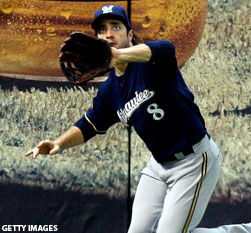Brewers LF Ryan Braun became the first MLBer to have a positive drug test "overturned on appeal when he was informed that a three-man arbitration panel ruled against a 50-game suspension that would have begun on opening day," according to a front-page piece by Tom Haudricourt of the MILWAUKEE JOURNAL SENTINEL. After MLBPA Exec Dir Michael Weiner voted in favor of Braun and MLB Exec VP/Labor Relations & HR Rob Manfred voted "to uphold the test result," independent arbitrator Shyam Das "cast the decisive vote." He ruled in Braun's favor "because of a chain-of-custody dispute that occurred after his urine sample was taken" during an Oct. 1 drug test. Sources said that the sample "was not dropped off that day at FedEx to be sent to the MLB testing lab in Montreal because the collector thought it was too late and the shipping company was closed." The collector instead "kept the sample, and perhaps others, refrigerated at home for two days before making the shipment." Though the seals on the samples were "unbroken upon arriving at the lab, that lapse in protocol became the crux of the hearing in which Braun's side contested the validity of the test itself." The MLB drug policy states in part, "Absent unusual circumstances, the specimens should be sent by FedEx to the laboratory on the same day they are collected." MLB in a statement said it "vehemently disagrees" with the decision. While MLB officials considered Braun's exoneration "to be based strictly on a technicality, the player's side did not see it that way." Because of the delay in shipping, "they considered the chain of custody broken and therefore the test itself to be invalid." Sources said that 12 players have "previously appealed positive tests without success." By design, MLB "would not announce a successful appeal because of the supposed confidentiality of the program." It "remains to be seen if the source of the leaks will be identified and if they compromise the drug program going forward" (MILWAUKEE JOURNAL SENTINEL, 2/24). The Boston Globe's Peter Abraham said, "The good feelings that existed during the collective bargaining agreement have been torn apart a little bit by this decision, and it’ll be interesting to see where it goes from here” (“NESN Daily,” NESN, 2/23).
WILL MLB CHANGE THE POLICY? In N.Y., Thompson, O'Keeffe & Martino cite sources as saying that baseball has "already begun discussing adjustments in its collection process with the union but it is not expected to challenge the arbitrator’s ruling and believes its drug program is solid." One source said, "It’s a technical problem that can be fixed." One player who was tested in the offseason said of the collection process, "The chaperone comes to your house (or to the clubhouse), and he physically watches you urinate into a plastic cup. ... He leaves with your sample in the sealed box. I think it is a stretch to think that someone is going to take your sample and alter it, but I suppose it is possible" (
N.Y. DAILY NEWS, 2/24). Rockies SS Troy Tulowitzki said, "You get a scenario like this where a guy is presumed guilty and now he's innocent, it makes you feel like it could happen to anybody. I think we all need to watch out for our protection. The testing might need to be reviewed" (
DENVER POST, 2/24). The JOURNAL SENTINEL's Haudricourt said, “We do have some questions to answer about the process, and I think we’re going to hear a lot in the coming days about whether they’ll be any changes or not” (
JSONLINE.com, 2/23). ESPN's Buster Olney: "I do think there will be a lot of discussion about change in the drug testing system going forward, including rewriting of the protocol” (
“Mike & Mike in the Morning,” ESPN Radio, 2/24). But former WADA Chair Gary Wadler said that MLB's drug-testing program "should not be condemned" despite the overturned suspension. Wadler said, "Just because one case is reversed doesn't mean that the whole system is broken by any means of the imagination. One swallow does not make a summer. I think it would be a terrible tragedy if players throw out drug testing and say it doesn't work." U.S. Anti-Doping Agency CEO Travis Tygart said, "It's a gut kick to clean athletes in baseball for a technicality like this to undermine their rights" (
USA TODAY, 2/24).
BIG BLOW TO MLB: In N.Y., Belson & Schmidt note the ruling "was a blow to Major League Baseball and Commissioner Bud Selig, who has repeatedly said that his sport now has a comprehensive testing system second to none and that it has fully addressed a drug problem that has plagued it for more than a decade." Braun's successful appeal "raises fresh questions about whether other positive drug tests might have been the result of inefficient shipping methods or outright tampering, and it could provide a road map for other players in the future as they seek to overturn positive test results" (N.Y. TIMES, 2/24). Also in N.Y., Joel Sherman writes under the header, "MLB Big Losers After Letting Braun Off The Hook." Sherman: "I sense the majority of devoted fans will believe that Braun won because of the incompetence of someone else and not because he was pristine. This will haunt him." However, it is baseball itself that will "be most haunted now." At a time when there was "some belief being restored that the testing works and that banned drugs were -- if not being eliminated -- at least being significantly diminished in the sport, there is this" (N.Y. POST, 2/24). Sherman added, “This one is going to stain Major League Baseball at a moment where they felt like they were moving away from this steroid era" ("Yankees Baseball Daily, YES Network, 2/23). In Milwaukee, Bob Wolfley writes MLB's drug-testing policy "now has a crack in it" (MILWAUKEE JOURNAL SENTINEL, 2/24). ESPN.com's David Schoenfield wrote under the header, "Braun's Overturn A Sad Day For Baseball." Schoenfield: "I want to believe that MLB's drug testing program works. ... But I can't believe that. Instead, I believe this is a troubling day for baseball." The system "didn't work" (ESPN.com, 2/23).
TECHNICALITY WINS THE DAY: YAHOO SPORTS' Jeff Passan writes under the header, "Braun Ruling Deals Blow To Selig's Testing Program." Braun "beat the program," as his lawyers "never bothered arguing whether or not Braun had taken the synthetic testosterone that showed up in his urine." The appeal succeeded on "a technicality." It was a "loophole," and most of all, it was "brilliant lawyering by Braun's attorneys." Passan: "To lose for the first time in arbitration, then, and in such fashion no less, devastated those in baseball committed to making the game as clean as possible." One baseball official said, "This is like a criminal getting off because he wasn't read his Miranda rights" (SPORTS.YAHOO.com, 2/24). In N.Y., Tyler Kepner writes Braun succeeded "on a technicality; there's no other way to say it." On some level, MLB is "probably happy that Braun was not suspended," as he is the "best player on a small-market playoff team." But publicly, baseball "came out firing against Braun," and MLB's "frustration is understandable." Their "doping cops nabbed a big game and let him get away" (N.Y. TIMES, 2/24). In Oakland, Monte Poole notes the arbitrator's decision "means only that Braun beat the system." Braun "walks, in short, on a technicality." Poole: "What it does is make MLB a clear loser. What it also does is compel every clean player to wonder just how secure MLB's drug-testing procedures are, and, moreover, whether they can really be successful" (OAKLAND TRIBUNE, 2/24).
THE SYSTEM WORKS: CBSSPORTS.com's Danny Knobler wrote if baseball or "any other sport is going to have a drug-testing system, there needs to be a way for a player to appeal a positive test." If there is "going to be an appeal process, it needs to be fair enough that if the player makes a legitimate case that the test was flawed, he gets off." Knobler: "Does it mean that Ryan Braun is absolutely clean? There's absolutely no way to know that, just as there's no way to know it with certainty about any player. But with this verdict, he gets as much the benefit of the doubt as anyone else. ... It means that the system works" (CBSSPORTS.com, 2/23). SI.com's Epstein & Lemire write, "Whether one agrees with the end result or not, Braun received his due process and the ruling was administered by an independent arbitrator who has been working on such cases since 2000" (SI.com, 2/24). FOXSPORTS.com's Ken Rosenthal wrote, "It’s called due process, folks. You might not like or even trust the result. But the rules were collectively bargained." Rosenthal: "Don’t tell me that Braun got off because he is the National League MVP, because baseball is trying to protect his image, because he plays for commissioner Bud Selig’s former team. ... The better questions concern how the sport’s case fell apart" (FOXSPORTS.com, 2/23). ESPN’s Tony Kornheiser said, "I understand why baseball’s angry because it calls their test into question. They spent so much time establishing good relationships by great testing and now everybody is free to appeal.” ESPN’s Michael Wilbon said MLB has this “mechanism set up to appeal and that appeal’s been heard." Wilbon: "That seems to me to be as essential to the system as the drug test” (“PTI,” ESPN, 2/23). In Seattle, Larry Stone notes there is a "collectively bargained mechanism for a player to dispute a positive drug test." Braun "went through the process, and won." MLB should "accept that, or why have the appeal process in the first place?" (SEATTLE TIMES, 2/24).
 |
Pundits wonder how Braun's successful appeal will affect credibility of drug testing
|
EVERYONE'S A LOSER: USA TODAY's Mike Lopresti writes, "We have a decision, but no clarity. A suspension overturned, but no real understanding why." If a drug test is "truly mishandled or botched, then the reasonable doubt must carry the day for the athlete." But neither baseball "nor any other sport can afford to lose on technicalities" (USA TODAY, 2/24). In N.Y., Mike Lupica writes the overturning of Braun’s suspension "doesn’t mean Braun is clean, no matter what he says or how many times he says it or what he expects reasonable people to believe." Lupica: "He wasn’t exonerated. He was acquitted. There’s a difference. ... If you want to think justice was served, have at it." No one was "looking to get Ryan Braun here from the start, get him good or pin a drug rap on him, or take down one of the sport’s golden boys" (N.Y. DAILY NEWS, 2/24). ESPN.com's Jayson Stark wrote, "We don't know quite what was proven," and we "remain free to believe what we want to believe." The conspiracy theorists "will see a cover-up." Braun's fans "will see its favorite fallen hero walking out from under this awful cloud." Stark: "And the rest of us? We'll just be as confused as ever" (ESPN.com, 2/23). In Philadelphia, Phil Sheridan writes either Braun "got away with cheating his way to an MVP award because MLB made a mistake with the mechanics of his urine test, or Braun's reputation was tarnished because someone at MLB violated the confidentiality clause that is vital to the testing program." Sheridan: "Either possibility is unacceptable. Either makes a mockery of the entire concept of drug testing in professional sports" (PHILADELPHIA INQUIRER, 2/24).





